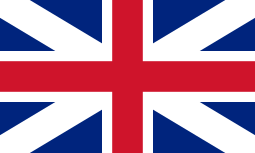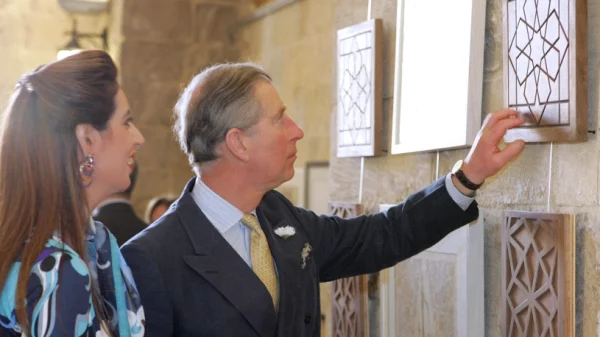A Green King: Charles III
Britain’s then Prince Charles admires modern Islamic art pieces at the Qasr Al-Taz School for traditional arts in Cairo during his tour of the city on 21 March 2006 (AFP)
Author:
Professor Ibrahim Ozdemir,
Uskudar University,
Director, Forum on Environmental Ethics
ib60dmr@gmail.com
Plato’s dream came true after twenty-four centuries, and we finally have an environmental king or green king: Charles III.
Plato, one of the godfathers of Western culture and civilization, argued that “there will be no end to the troubles of states… humanity itself, till philosophers become kings in the world…”
I do hope the new Green King, at least, will try to end the troubles of our planet Earth.
Therefore, I am perplexed whether Plato is happy with the green king or jealous of us.
On the other hand, environmentalists have always complained that our leaders do not listen to us and do not pay enough attention to environmental issues. Even some of them are climate deniers.
Albeit belatedly, we now have an environmental king. While we eagerly await what he will do for the environment, we can remember what the new king has said and what steps he has taken so far.
For years, I have tried to follow Prince Charles of Wales, now King Charles III, on the throne of Great Britain, because of his thoughts and concerns for the environment. More precisely, I have read his messages, references, and views on the environment.
One of his lectures on this subject was translated and published by one of my students at the Department of Theology, Ankara University.
Prince Charles’ intense interest in Islam and the environment continued for years. He also learned Arabic. When British Muslim and scholar Abdulhakim Murad (Timothy Winter) asked him why he wanted to learn Arabic, Prince Charles replied: “To understand the Qur’an better!”.
In his book Charles at Seventy: Thoughts, Hopes and Dreams, Robert Jobson noted that the monarch studied the Islamic holy book, the Qur’an and signed letters to Muslim leaders in Arabic.
The British tabloid Daily Mirror announced this in March 2013 as follows: “His destiny is to defend Christianity as head of the Church of England when he is king. This, however, has not stopped the Prince of Wales from long being fascinated by Islam”. Moreover, it tells readers, “Charles has taken this interest further by having lessons in Arabic for the last six months”.
According to the newspaper, these courses “would enable him to read the Qur’an in its original form as well as decipher Arabic script on visits to mosques and museums”.
From what Prince Charles writes and speaks in public, it is clear that he understands the core messages of the Qur’an quite well.
In this context, a brief look at his views on Islam and the environment may help us better understand the new green king.
Prince Charles gave a speech on Islam and the Environment at the Oxford Centre for Islamic Studies (OXCIS) on June 9, 2010.
In this speech, Prince Charles said that people need to understand the damage they are doing to the environment and take steps to stop it while it is still possible. He emphasized that all the great religions of the world have warned people to protect the environment created by God and warned us that: “These are not arbitrary limits; they are the limits imposed by God and, as such, if my understanding of the Qu’ran is correct, Muslims are commanded not to transgress them”.
This reminds me universal message of the Qur’an on consumption:
“O CHILDREN of Adam! Beautify yourselvesfor every act of worship, and eat and drink [freely], but do not waste: verily, He does not love the wasteful!” (7:31)
The message is clear, and it’s a call to all humanity.
Moreover, in the same speech, he added: “We share this planet with the rest of creation for an excellent reason – and that is, we cannot exist on our own without the intricately balanced web of life around us. Islam has always taught this and to ignore that lesson is to default on our contract with Creation”.
According to Prince Charles, a current divide between humans and nature has evolved over the last centuries. He blamed this divide not only on the processes of industrialization, technological development, and the pursuit of economic growth but also on the modern ideology dominating the Western world, which views the teachings of all the prominent religions as “backwards-looking”.
What’s Green about the Qur’an?
Prince Charles shared his thoughts on Islam and the environment, mainly as addressed in the Qur’an:
«The Qur’an describes nature as ‘the work of a single benevolent power’. Since God created nature and man, there has been no separation, division, or alienation between them. Man and nature are ‘parts of a living, conscious whole’.
Humans live on earth only for a short time. They can do so only through the hospitality of God, who ‘gives us our provisions, shelter, clothing, vehicles and transportation’».
He added:
«The inconvenient truth is that we share this planet with the rest of creation for an excellent reason – and that is, we cannot exist on our own without the intricately balanced web of life around us. Islam has always taught this and to ignore that lesson is to default on our contract with Creation.
All these Judeo-Christian conceptions of man’s position in the world are very different from the Islamic understanding in the Qur’an and Sunnah, which sees the human being as one of the rulers of nature. Nature has been entrusted to human beings as a trust. Human beings have to protect it and live in balance with it. Each generation must pass on a clean and protected environment to the next».
Emphasizing that “there are limits to the richness of nature” based on his knowledge of Islam and the Qur’an, Prince Charles makes it clear that “these are not arbitrary limits, they are the limits imposed by God and, as such, if my understanding of the Qu’ran is correct, Muslims are commanded not to transgress them”, Charles, a member of the Church of England, said.
Moreover, in the same speech, he added: “We share this planet with the rest of creation for a very good reason – and that is, we cannot exist on our own without the intricately balanced web of life around us. Islam has always taught this and to ignore that lesson is to default on our contract with Creation”.
Summarizing Islam’s understanding of the environment in this way, Prince Charles invited people worldwide to follow the “green path of Islam” to save the environment before it was too late.
Moreover, in his speech on Islam and the West in October 1993, Prince Charles, discussing Western and Islamic civilizations in detail, made the following observation:
«Islam can teach us today a way of understanding and living in the world which Christianity itself is the poorer for having lost. At the heart of Islam is its preservation of an integral view of the Universe».
Prince Charles was a prince when he made the above observations. Twelve years on, he is now King of Great Britain.
Our sincerest hope is that King Charles III will continue his environmental sensitivity and make efforts to protect the environment and ensure that future generations live in a cleaner, safer, and healthier world…
He also may be a bridge of understanding and cooperation among rich and diverse environmental groups and activists.
In this sense, I would like to state that we will support all the positive steps he will take and criticize the negative ones.

 English
English Italian
Italian